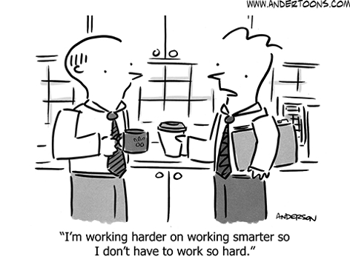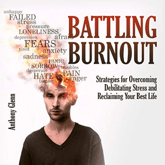
People are generally confused when I tell them I work two different project management jobs that both involve working with multiple clients all in different industries and requiring different levels of attention.
The most common questions I hear
- “Why would I do that to myself?”
- “How do I keep any of the work straight”
- “How do I manage to do it without getting completely burnt out?”
It’s taken some time and trial and error, but I have found these five tips help keep me from getting burnt out between my work and personal life:
1. Work Smarter Not Harder
 We may think we are accomplishing more from working long hours and putting in extra time, but in reality, these tasks are being drug out or being done in inefficient ways.
We may think we are accomplishing more from working long hours and putting in extra time, but in reality, these tasks are being drug out or being done in inefficient ways.
Working excessively long hours cuts into your personal time causing you to sacrifice parts of your personal life. Instead, you need to look at the resources available to you to help increase your productivity such as:
- Asking for guidance on a task
- Using management and easy communication systems
- Delegating work so that it is not all on your shoulders.
Communication is foundational for these. Here are tools to collaborate (or delegate) to others:
- Google Chat.
- Chanty.
- Microsoft Teams.
- RocketChat.
- Discord.
- Mattermost.
- Flock.
- Ryver.
2. Focus On One Task At a Time
It’s easy, especially when working multiple jobs with multiple clients to want to multitask and try to complete two or even three tasks at once. Although multitasking may feel like you’re accomplishing more, studies have shown you are actually slowing yourself down by forcing your brain to have to switch between projects. You are more productive and accurate at completing tasks when you just focus on them one at a time.
In fact, it may surprise you to learn that “multi-tasking” is a myth!
“We have a brain with billions of neurons and many trillion of connections, but we seem incapable of doing multiple things at the same time. Sadly, multitasking does not exist, at least not as we think about it. We instead switch tasks. Our brain chooses which information to process. For example, if you listen to speech, your visual cortex becomes less active, so when you talk on the phone to a client and work on your computer at the same time, you literally hear less of what the client is saying.” – Harvard Business Review
3. Take a Break
When you’re busy it’s easy to think you don’t have time to stop for a minute or even take your lunch break, but it’s important to make time for yourself and have those mental breaks. Taking a few breaks throughout the day allows you to relax and avoid becoming too stressed out and reaching your burn out point. Going on a walk, finding a quiet room to sit in, or taking some time to have a snack gives your mind and body a chance to recharge.
Regular breaks can prevent decision fatigue, restore motivation, increase productivity and creativity, and consolidate memories. Breaks that involve even five minutes of movement can also improve our health and well-being.
Taking time to grab a coffee or chat with a team member is far from “doing nothing,” but it’s an important way to step off the metaphorical treadmill and re-establish your priorities.
Psychology Today offers an outstanding overview of the benefits of breaks, and how+when to take breaks. I highly recommend that you take a moment to read the article: “How Do Work Breaks Help Your Brain? 5 Surprising Answers”
4. Learn To Say No
It has become almost a bragging point to talk about the excessive hours you work and extra projects you take on, but it shouldn’t be that way. You need to learn to prioritize yourself first before taking on additional responsibilities that slowly take over your personal time and lead to you having a hard time completing your own job. It may be uncomfortable at first, but it’s okay to say no or delay your answer to check your own responsibilities first.
Christine Lui, the Innovation Editor at Harvard Business Review, offers an excellent example of how it goes well in her head, but not so well in reality:
5.Treat Yourself
One of the most important ways to keep yourself from feeling overwhelmed is to make sure you do things and make time for yourself. Schedule time with friends, have a spa day, go out to a nice dinner, whatever it is that you like to do make time for it! I like a great book, painting and grateful for the time with friends.
Since you might be in motion of never-ending work, ideas to “treat yourself” might be lacking. If that is the case, Lifehack has an article with “30 Ways to Treat Yourself.” Not all of them will sound appealing but I perked up when I read #13 – “Buy a seriously decadent treat, like a bar of your favorite chocolate, and savor it.”
Setting aside time for yourself gives you a chance to relax, unwind, and ignore what you may have going on at work. Make your personal wellbeing a priority and leave the stresses of work in the office.
Can you die from an unbalanced work-life? YES! A new study this year says people are dying.
“Long working hours are killing hundreds of thousands of people a year, according to the World Health Organization (WHO). The first global study of its kind showed 745,000 people died in 2016 from stroke and heart disease due to long hours.” – Source BBC News
Maintaining a work life balance doesn’t have to be impossible, even for the busiest of people. It does however take a conscious effort to set boundaries, check in with yourself, and communicate when you are overwhelmed.
What should you do next?
Get this audiobook on Audible.
Battling Burnout
 Strategies for Overcoming Debilitating Stress and Reclaiming Your Best Life
Strategies for Overcoming Debilitating Stress and Reclaiming Your Best Life
By: Anthony Glenn
Narrated by: William Bahl
Length: 1 hr and 14 mins
It is short and powerful, and you can listen to it while you are taking that walk!
About the Author
 Christine has a diverse experience in many support roles in retail, legal and e-commerce.
Christine has a diverse experience in many support roles in retail, legal and e-commerce.
Christine currently splits her time between a variety of companies as a project manager and coordinator. She lives in Columbus with her cat and enjoys playing sand volleyball, paddle boarding and spending time out with friends.
Learn more about Christine
